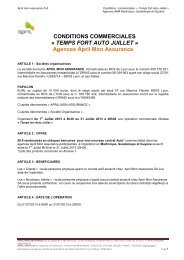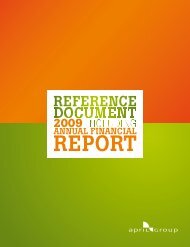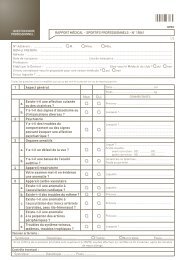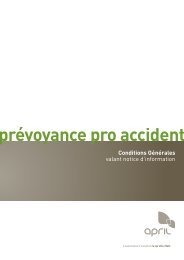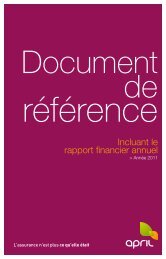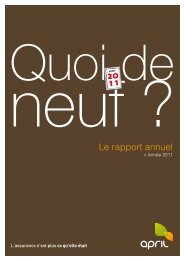2007 - April
2007 - April
2007 - April
You also want an ePaper? Increase the reach of your titles
YUMPU automatically turns print PDFs into web optimized ePapers that Google loves.
2.0<br />
Notes to the consolidated financial statements at December 31 st <strong>2007</strong><br />
1.20. Receivables from cession operations on<br />
reinsurance<br />
Receivables from cession operations on reinsurance<br />
represent the sums to be collected from reinsurers: claims<br />
pending compensation and commissions to be received.<br />
1.21. Cash and cash equivalents<br />
Cash and cash equivalents comprise liquid assets and units<br />
in cash-based UCITS other than those held by insurance<br />
companies recorded under financial investments (cf. Note<br />
1.17).<br />
They represent very short-term, liquid investments that may<br />
be converted at any time into a known cash amount and<br />
subject to a low risk of changes in value.<br />
Cash investments are valued on a fair value basis, with any<br />
unrealized or realized gains or losses booked on the income<br />
statement under “financial income net of charges and<br />
excluding cost of debt”.<br />
The fair value is determined in relation to the market price as<br />
on the closing date for the period.<br />
1.22. Trade receivables<br />
Trade receivables group together premium requests pending<br />
payment issued by APRIL GROUP brokerage companies as<br />
well as receivables relating to services provided.<br />
Premiums requested are only recorded in the accounts as on<br />
the date that the cover effectively takes effect, and not on<br />
the date on which premium requests are sent out when this<br />
is earlier.<br />
A provision for depreciation may be recorded for trade<br />
receivables relative to the share of commissions on the<br />
premiums for clients whose policies have been cancelled for<br />
non-payment of premiums.<br />
This share is calculated based on the historical results<br />
for disputed collection operations on such cancelled<br />
policyholders.<br />
1.23. Underwriting provisions for insurance policies<br />
Underwriting provisions linked to insurance companies are<br />
recorded gross of reinsurance operations as liabilities on<br />
the balance sheet, with the reinsurance section booked<br />
as an asset under “transferee and retrocession share in<br />
underwriting provisions”. Such underwriting provisions<br />
are determined based on statistical and actuarial data in<br />
accordance with the French Insurance Code (Code des<br />
Assurances), notably the laws governing disability and<br />
invalidity appended to this code.<br />
1.24. Liability adequacy tests for Group insurance<br />
companies<br />
At the time of each close of accounts, liability adequacy tests<br />
are carried out for each consolidated company in order to<br />
ensure the adequacy of insurance liabilities. To conduct these<br />
tests, the companies consolidate policies based on common<br />
criteria, factoring in how they have been acquired, how they<br />
are managed and how their profitability is measured.<br />
Any inadequate provisions are recorded against earnings. In<br />
the specific case of non-life insurance policies, a provision for<br />
current contingencies is booked for policies whose premiums<br />
are estimated to fall short of the level required to cover<br />
future management costs and claims.<br />
1.25. Provisions for contingencies and losses<br />
In accordance with IAS 37 “Provisions, contingent liabilities<br />
and contingent assets”, a provision is recorded when the<br />
Group has a legal or implied obligation resulting from past<br />
events that will generate an outflow of resources without at<br />
least an equivalent counterparty, provided that future cash<br />
outflows may be estimated on a reliable basis.<br />
This item comprises commitments with uncertain maturities<br />
or amounts stemming from commercial and tribunal disputes<br />
or other risks.<br />
In general, each known dispute in which the company is<br />
involved has been reviewed by management as on the<br />
date for the close of accounts, further to advice from<br />
external advisors as relevant, with the provisions deemed<br />
necessary recorded in order to cover the estimated risks.<br />
1.26. Staff benefits<br />
Short-term benefits due within 12 months of the end of<br />
the financial year are recorded for the period during which<br />
the services were provided by members of staff and for the<br />
amount that the company expects to pay.<br />
Provisions are recorded for these amounts on a nondiscounted<br />
basis.<br />
104<br />
Return to the contents section




